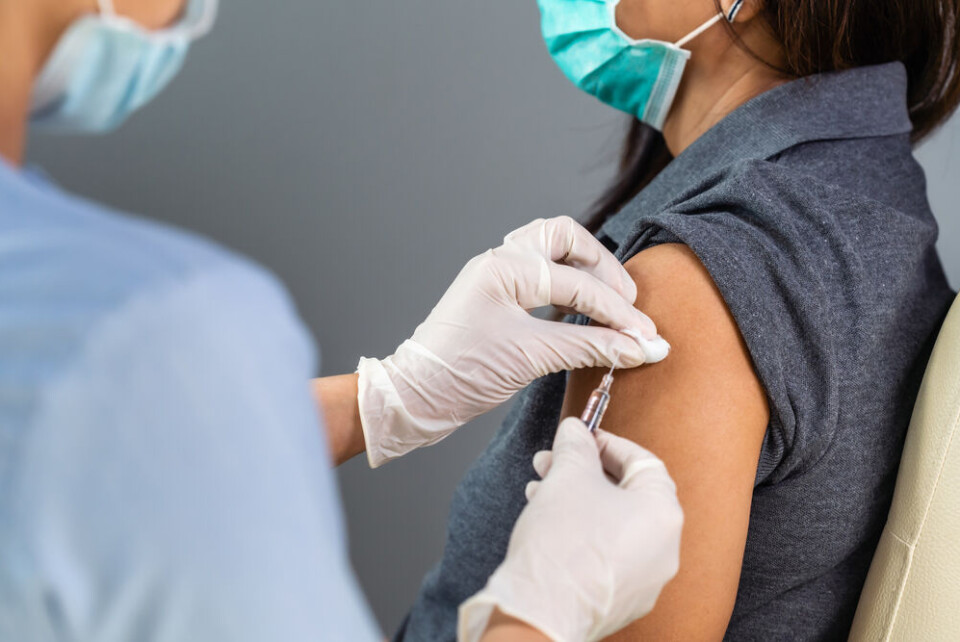-
French crisps brand gains global attention after Dua Lipa post
Singer posted photo of her shopping basket and the only food items were Brets crisps in braised chicken, honey mustard, and ‘Fromage du Jura’ flavours
-
Why supermarkets are urging shoppers to buy French leeks
Try our French classic leek vinaigrette recipe
-
New bill targets skiers under influence of alcohol or drugs
There are not currently any specific rules on skiing while under the influence
Five questions on France’s new Covid vaccination campaign
As cases of the Eris variant rise, we look at plans for a new vaccine rollout in autumn

France is to launch a new Covid vaccination campaign alongside the usual seasonal flu campaign this autumn, it has been announced, as a new variant causes cases to increase. We look at how it will work.
New variant Eris, or EG.5, is suspected to be behind a new rise in cases across the country. The rise has also been blamed on increased socialising over the summer holidays, and naturally declining immunity after people’s most recent vaccinations.
Read more: Eris: New, more contagious variant sparks Covid escalation in France
Read more: Covid ‘rebound’ in France: Which areas, and are doctors worried?
There were just over 900 A&E emergency services visits across France for Covid-related issues between July 31 and August 6, and more than 1,500 medical interventions for suspected Covid by the at-home doctor service SOS Médecins.
In its most recent bulletin (August 11), health authority Santé publique France said: “The current situation requires us to remain vigilant.”
Director general of the World Health Organization (WHO) Tedros Adhanom Ghebreyesus called on all countries to continue to “reduce the disease burden…and prepare for a possible worsening situation caused by new variants of the virus”.
In a statement, the WHO made seven recommendations for the continued management of Covid. This included that countries should still “ensure detection of early warning signals” of the illness, and are “recommended to continue to offer Covid-19 vaccination”, especially for “high-priority groups”.
We answer five questions on France’s autumn campaign below:
1. When will the vaccination campaign start?
The autumn vaccination campaign will start on October 17 in mainland France, plus Corsica.
The campaign will go ahead as planned “subject to the absence of an epidemic wave linked to Covid-19 before the autumn,” the direction générale de la santé (DGS) stated on July 19.
If an epidemic resurgence is observed in the meantime, the date may be advanced. However, so far, the DGS has said that the current epidemic status in recent weeks did not require this.
Stéphane Paul, professor of immunology and member of the vaccination commission, la commission technique de vaccination de la Haute Autorité de santé (HAS), agreed with this assessment, in a statement to FranceInfo.
He said: “The [current] situation is not very alarming: the increase in the number of cases is local and linked to festive [summertime] events.”
2. Who will be invited to be vaccinated?
Anyone who is considered to be at high risk of severe illness.
This includes people with underlying conditions and chronic illnesses; those with psychiatric disorders, those with immunodeficiency, pregnant women, and people aged 65 and over.
People who are in vulnerable people’s entourage or in regular contact with them, including professionals in the health and medico-social sectors will also be eligible.
Professor Paul said that “there is no particular advantage in extending the programme to the entire population, as we have not recorded any particular severity criteria for people who are not at risk”.
Theoretically (and as in previous Covid vaccination campaigns), the campaign could be opened to the rest of the population eventually, as the coverage of vaccines wanes over time. This has not been suggested or confirmed officially, however.
Vaccination is free for anyone eligible who wants it. People must wait six months since their last Covid vaccination or infection before having another vaccination.
3. Which vaccines will be used?
The campaign will use vaccines that use mRNA technology, and have been adapted to the Omicron variant. This will mean vaccines by Pfizer, and Moderna as opposed to other types that were used in the first vaccination campaign rounds, such as the Vaxzevria / AstraZeneca viral vector vaccine.
Moderna will be used for people aged 30 and over.
These vaccines will be used regardless of the type of vaccine the patient received before.
4. Can I get the flu vaccine at the same time?
Yes, if you are eligible for both.
The Covid vaccination campaign will be combined with the seasonal ‘flu campaign, as “the people targeted by the Covid-19 vaccination are the same as those targeted by the influenza vaccination recommendations”, the DGS said.
The two vaccines can be given at the same appointment (for example, one injection in each arm), if you wish.
5. Will the vaccines target the new Eris (EG.5) variant?
Not specifically, although they are considered to be effective against this variant.
Pfizer and Moderna are among the pharmaceutical companies now working to develop vaccines that will target the new XBB1.5 variant specifically, a sub-variant similar to EG.5 (Eris).
However, this type of vaccine has not yet been authorised in Europe or the US.
They may be distributed, at least in the US initially, “in the third or fourth week of September”, according to Mandy Cohen, the director of the US Centers for Disease Control and Prevention (CDC), newswire Reuters reported.
It is not yet clear if this will apply to Europe as well as the US.
Related stories
Covid ‘rebound’ France: What are rules for testing, isolation, masks?
























